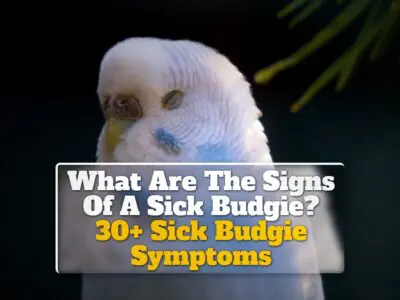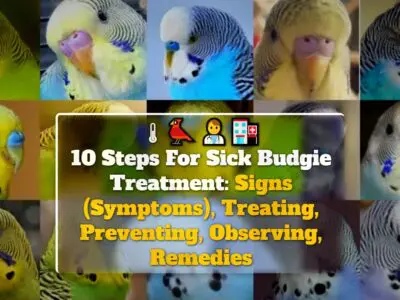Yes, while it’s rare, budgies can potentially transmit diseases to humans, including Psittacosis (Parrot Fever), Avian Tuberculosis, Salmonellosis, and others.
These illnesses can cause various symptoms from respiratory distress to gastrointestinal issues.
However, with proper hygiene and care, these risks can be significantly reduced.
As someone who has always been fascinated by our feathered friends, I know that keeping a budgie in your home can bring endless joy and companionship.
However, in my experience, both as a budgie owner, I’ve also come to realize that these lovely little creatures can inadvertently bring us into contact with various illnesses.
In this article, we’ll be exploring a list of diseases that you could potentially contract from your budgie, along with prevention methods and treatments.
What Diseases Can Humans Get from Budgies?
In this section, we will explore the diseases that humans can contract from budgies.
We will explain how these diseases can affect your health and also shed light on prevention methods and treatments.
It’s important to remember that while these diseases exist, the likelihood of contracting them is relatively low, especially if you follow good hygiene practices and provide proper care for your budgie.
Psittacosis (Parrot Fever)
Psittacosis, commonly referred to as Parrot Fever, is a bacterial infection caused by a bacterium named Chlamydia psittaci.
Budgies can carry this bacterium without displaying any symptoms, posing a hidden threat to their human companions.
The disease can be transmitted to humans through inhalation of the bird’s dried droppings, respiratory secretions, or feathers.
Once a human gets infected, they may experience symptoms such as fever, chills, headaches, muscle aches, cough, and even pneumonia.
Preventive measures include maintaining a clean environment for your budgie and using protective gear while cleaning their cages.
Early detection and treatment with appropriate antibiotics are key in managing this disease.
Allergic Reactions
Humans can develop allergic reactions to budgie dander, a common issue among bird keepers.
These allergies can trigger respiratory symptoms such as sneezing, coughing, and wheezing.
In addition, itchy and watery eyes, as well as skin rashes, may occur.
These allergic reactions can vary in severity from person to person, and individuals who know they have allergies should be cautious when handling budgies or spending time in their proximity.
Reducing exposure and taking antihistamines can help manage the symptoms.
Avian Tuberculosis
Avian tuberculosis is another disease that budgies can transmit to humans.
This infection is caused by certain strains of mycobacteria.
Just like with the other diseases, budgies can carry these bacteria without showing symptoms, making it a stealthy disease.
Transmission to humans can occur through direct contact with the bird, their droppings, or contaminated materials.
Once infected, a human might experience symptoms such as fever, fatigue, weight loss, cough, and night sweats.
The key to prevention here is good hygiene practices and protective gear while handling your budgie.
Salmonellosis
Another disease that you might get from your budgie is Salmonellosis.
Budgies can carry the Salmonella bacteria without showing signs of illness.
The bacteria can be passed on to humans through direct contact with the bird, their droppings, or surfaces that they have contaminated.
Once infected, a human can experience symptoms like diarrhea, abdominal pain, fever, and vomiting.
The preventive measures for this disease are similar to the others, with cleanliness and hygiene being the top priorities.
Ornithosis (Bird Fancier’s Lung)
Ornithosis, more commonly known as Bird Fancier’s Lung, is a respiratory disease that can occur from exposure to proteins in bird droppings, feathers, or secretions.
The disease can cause symptoms that mimic those of pneumonia, including fever, cough, chest pain, and shortness of breath.
The disease can be prevented by regularly cleaning and sanitizing your bird’s environment, and by using protective equipment when handling your budgie.
If detected early, the disease can be managed effectively, allowing you and your feathery friend to continue enjoying each other’s company.
Avian Influenza (Bird Flu)
Avian influenza, commonly referred to as bird flu, is a type of influenza virus that naturally occurs in wild aquatic birds.
Domesticated birds such as budgies can contract this virus and, in turn, pass it on to humans.
Transmission usually occurs through direct contact with infected birds or their secretions.
In humans, symptoms can range from mild flu-like symptoms to severe respiratory illness.
Preventive measures include good hygiene practices, especially hand hygiene after handling birds, and keeping the birds’ environment clean and disease-free.
Candidiasis
Budgies can potentially harbor a fungal infection known as Candidiasis, caused by the Candida species.
While it’s not very common, humans can contract this infection through contact with contaminated bird droppings or oral secretions.
Symptoms of Candidiasis in humans may include oral thrush, skin rashes, and in more severe cases, systemic infections in individuals with weakened immune systems.
Good hygiene and regular cleaning of your budgie’s cage can help prevent the spread of this fungus.
External Parasites (Mites or Lice)
Just like any other pets, budgies can be infested with external parasites like mites or lice.
These parasites usually feed on birds, but they can occasionally bite humans, causing temporary discomfort or skin irritation.
While they do not typically transmit diseases to humans, their bites can be annoying and cause mild skin reactions.
Regular checks for parasites and keeping your budgie’s living quarters clean can help prevent an infestation.
Cryptococcosis
Budgies can be carriers of a fungal infection known as Cryptococcosis, caused by the Cryptococcus neoformans fungus.
Humans can contract this infection through inhalation of airborne spores.
In humans, Cryptococcosis primarily affects the lungs but can spread to other organs if left untreated.
Symptoms may include cough, headache, fever, and in severe cases, neurological issues.
Keeping the birds’ environment clean and well-ventilated can help reduce the risk of this fungal infection.
Giardiasis
While often associated with contaminated water, budgies can potentially carry the parasite Giardia.
Humans can contract Giardiasis through direct contact with infected bird feces.
The infection primarily affects the gastrointestinal system, causing symptoms such as diarrhea, abdominal pain, and nausea.
Regular cleaning of cages and good hand hygiene can help prevent this parasitic infection.
Pasteurellosis
Budgies can sometimes harbor the Pasteurella multocida bacteria, responsible for a disease known as Pasteurellosis.
In humans, transmission usually occurs through bites, scratches, or direct contact with infected bird tissues.
Symptoms can range from localized skin infections to respiratory tract infections, and in severe cases, it can lead to systemic illnesses.
Regular cleaning and good hygiene practices, including washing hands after handling birds, can help prevent this bacterial infection.
Pseudomonas Infection
Commonly found in the environment, Pseudomonas bacteria can also be carried by budgies.
In humans, exposure to these bacteria can lead to various types of infections.
These include skin and soft tissue infections, respiratory tract infections, or urinary tract infections.
This bacteria can be found in bird droppings, making it essential to regularly clean your budgie’s environment and always wash hands after handling your feathered friend.
Allergic Alveolitis (Hypersensitivity Pneumonitis)
If you frequently interact with budgies or their environment, you may be at risk of developing Allergic Alveolitis, also known as Hypersensitivity Pneumonitis.
This immune-mediated lung disease can occur due to repeated exposure to organic substances from birds, like droppings or feathers.
Symptoms might include a cough, shortness of breath, and fatigue.
It’s recommended to use protective measures such as wearing masks and gloves when cleaning bird cages to limit exposure.
Histoplasmosis
Histoplasmosis is a fungal disease that can be contracted by inhaling spores from the Histoplasma fungus, which can be present in bird droppings.
In humans, it can cause a variety of symptoms, including fever, cough, and fatigue.
In some cases, it might even cause severe lung disease.
Proper hygiene practices, including wearing protective gear while cleaning bird cages, can help prevent this infection.
Faqs
What Precautions Can I Take to Prevent Diseases from Budgies?
To safeguard yourself from diseases potentially transmitted from budgies, taking the following steps would be beneficial:
- Hygiene Practices: Regularly and thoroughly washing your hands before and after handling budgies or cleaning their cages minimizes the risk of infection. Refrain from touching your face after contact with your budgie until your hands have been cleaned.
- Frequent Cage Cleaning: Keeping your budgie’s environment clean, including its cage and accessories, can greatly reduce the likelihood of harmful bacteria or parasites.
- Balanced Diet for Budgies: Ensure your budgie’s diet is well-balanced to help boost their immune system, making them less susceptible to diseases that they can then pass on to you.
- Routine Veterinary Care: Regular vet checks can identify and address health issues early on, thus preventing diseases from spreading.
- Limit Contact when Ill: If you’re sick, especially with a respiratory illness, avoid close interaction with your budgie.
- Avoid Overcrowding Budgies: Keeping budgies in a spacious environment can reduce stress and prevent the rapid spread of diseases.
- Isolation of New Birds: Newly acquired birds should be quarantined and checked for diseases before they join your existing flock.
- Use Protective Gear: When dealing with a sick budgie or cleaning their soiled cage, use gloves and a mask to protect yourself.
By adopting these preventive measures, you can drastically lower your risk of contracting diseases from your pet budgies.
How Are Diseases Transmitted from Budgies to Humans?
Diseases from budgies to humans are usually transmitted through direct contact, either by handling the birds, through their droppings, or through respiratory secretions.
Inhaling dust from dried bird droppings can transmit diseases like Psittacosis and Cryptococcosis.
Bites or scratches can potentially transmit Pasteurellosis.
However, such transmissions are rare, especially if you take proper care and maintain good hygiene.
Are Certain People More at Risk of Contracting Diseases from Budgies?
People with weakened immune systems, such as the elderly, children, and those with autoimmune diseases or undergoing treatments like chemotherapy, are more susceptible to diseases from budgies.
Additionally, those who work in close contact with birds, such as pet shop employees and veterinarians, are at a higher risk due to increased exposure.
Therefore, these individuals should exercise extra caution and maintain strict hygiene practices.
If My Budgie is Sick, Does That Mean I Will Get Sick Too?
Not necessarily.
While budgies can carry diseases that can infect humans, the risk of transmission is generally low, especially if you are maintaining good hygiene and taking proper care of your pet.
If your budgie is showing signs of illness, it’s important to consult with a vet.
They can provide treatment for your budgie and advice on how to prevent the spread of the disease.
Can a Budgie Transmit the Same Disease to Humans More Than Once?
A budgie can carry a disease that could potentially infect a human more than once, especially if the person’s immune system doesn’t fully clear the infection or if they are repeatedly exposed to the disease.
However, recurrent infections are rare and proper hygiene and care greatly reduce the risk.



